|
|
|
Sort Order |
|
|
|
Items / Page
|
|
|
|
|
|
|
| Srl | Item |
| 1 |
ID:
154334
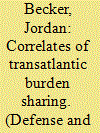

|
|
|
|
|
| Summary/Abstract |
While recent work has attempted to update the research agenda for transatiantic defense burden-sharing, there remain significant gaps between the public choice defense economics literature and the security studies literature. The presence of such a gap is unfortunate, because defense spending choices are likely shaped by factors identified by the public choice literature, as well as the strategic and cultural variables that the security studies literature tends to focus on, as well as domestic macroeconomic factors. The independent variables identified in recent qualitative literature are extremely useful analytically, and, fortunately, they have reasonable proxies in available quantitative data, which enables scholars to study them across large groups of countries and many years. This article builds upon such work to synthesize the most notable of the factors identified in the current literature, and offers some common analytical ground that will benefit both scholars and practitioners..
|
|
|
|
|
|
|
|
|
|
|
|
|
|
|
|
| 2 |
ID:
184986
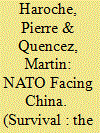

|
|
|
|
|
| Summary/Abstract |
This article explores and assesses NATO’s various options for dealing with Chinese power. Firstly, in terms of military approaches, we argue that NATO is unlikely to play a substantial role in US-led efforts to balance China in the Indo-Pacific region, or to designate China as a ‘threat’ in the North Atlantic area. Given that a clear-cut geographic division of labour between the United States and European partners would weaken the Alliance’s cohesion, NATO should instead focus on better integrating the ‘China factor’ into its military planning, in anticipation of the knock-on effects that a crisis in Asia could have on the European theatre. Secondly, in terms of the political approaches, although a formal expansion of NATO’s competencies is unlikely, stronger coordination with Indo-Pacific actors and with the European Commission could help overcome many of the Alliance’s geographic and functional limitations in dealing with China.
|
|
|
|
|
|
|
|
|
|
|
|
|
|
|
|
| 3 |
ID:
160996
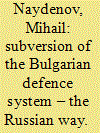

|
|
|
|
|
| Summary/Abstract |
Russia has long been pursuing an intended and calculated policy of keeping enough influence in Bulgaria in order to have control over national decisions. Together with the economic, energy, political and information tools used by Russia in its hybrid war against Bulgaria and in its bid to achieve an enduring “state capture,” defence is also a distinct target of Russian subversion now. A list of noticeable subversive actions with tangible effects can be summarised, ranging from fuelling division and manipulating public opinion, preventing the strengthening of the NATO position in the Black Sea, sabotaging defence reform to various options of subverting the modernisation of the Bulgarian Armed Forces and seeking new ways to keep legacy Soviet military equipment in operation as long as possible. This issue must be urgently addressed both nationally and in NATO.
|
|
|
|
|
|
|
|
|
|
|
|
|
|
|
|
| 4 |
ID:
154333
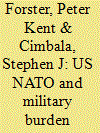

|
|
|
|
|
| Summary/Abstract |
NATO burden sharing has become an especially timely issue in the past several years as a result of a number of factors, including Russian annexation of Crimea and destabilization of eastern Ukraine in 2014. This article argues that alliance unity among the great democracies of Europe and North America is indispensable to peace and stability on the Eurasian continent. A fractured NATO, and especially, a large divide in purposes or commitments as between the United States and its European security partners, invites aggression and the possibility of inadvertent escalation. Past successes and failures in US-involved multinational peace and stability operations, within and outside of Europe, show that mission accomplishment requires give and take, including the occasional acceptance of unequal costs and benefits among the members, in order to achieve peace and security objectives.
|
|
|
|
|
|
|
|
|
|
|
|
|
|
|
|
| 5 |
ID:
188457
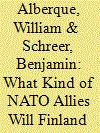

|
|
|
|
|
| Summary/Abstract |
Barring a Turkish veto, Finland and Sweden will join NATO as full members prior to the Alliance’s Vilnius Summit in June 2023. Both confront several political, military and defence-industrial choices regarding their membership, with different benefits and opportunity costs for each country and the Alliance depending on whether they select a low, medium or high level of ambition. Both are likely to adopt a medium level of ambition, opening up a range of new areas for cooperation with other allies and strengthening the Alliance as a whole. A high level of ambition is not likely in the short term, given the substantial political, financial and personnel costs it would entail. Nevertheless, it could eventually materialise.
|
|
|
|
|
|
|
|
|
|
|
|
|
|
|
|
| 6 |
ID:
175630
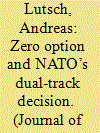

|
|
|
|
|
| Summary/Abstract |
An insufficiently understood paradox surrounded the NATO dual-track decision. This paradox was at the core of an almost classical high impact-low probability scenario which became reality with the INF Treaty of 1987, bringing NATO closer to a crisis of to be or not to be. NATO governments (except France) formally decided in 1979 that new long-range missiles in Europe were necessary but lacked political willpower to exclude the zero option, the possibility that NATO’s missile deployments may be obviated through arms control. The article analyses why this was the case, clarifies why this mattered, and draws policy implications from this crucial episode.
|
|
|
|
|
|
|
|
|
|
|
|
|
|
|
|
|
|
|
|
|